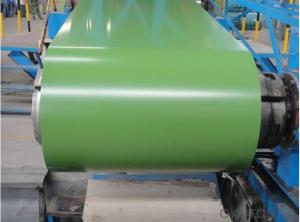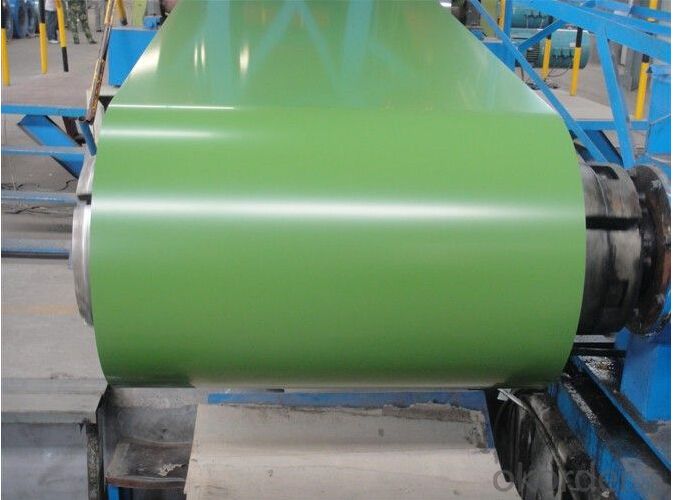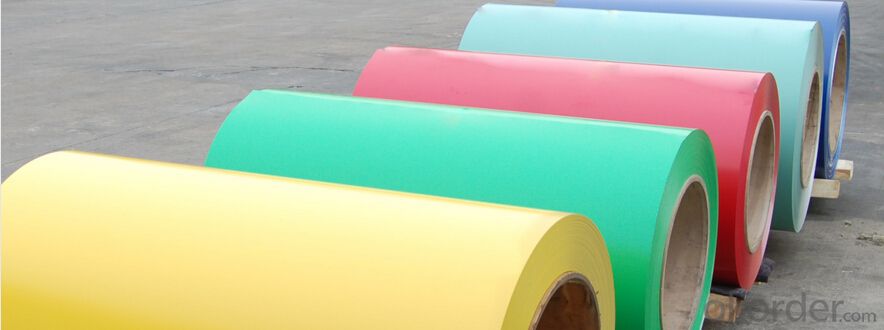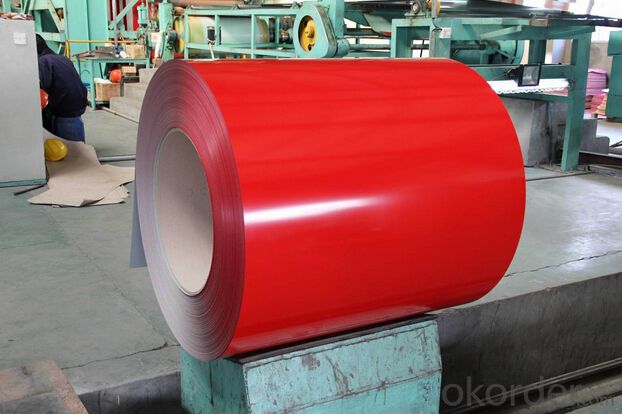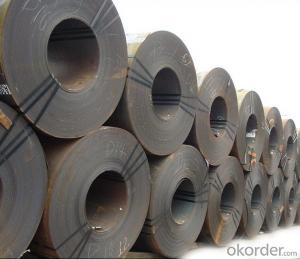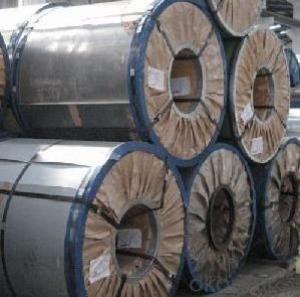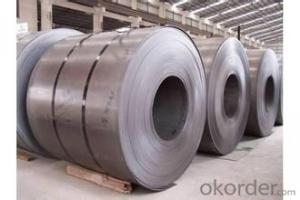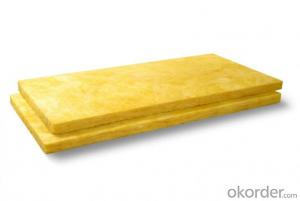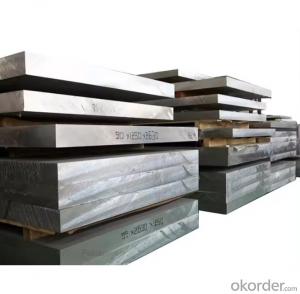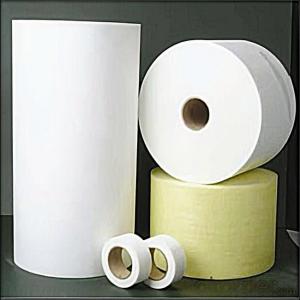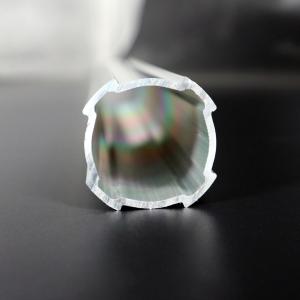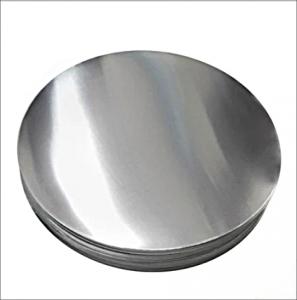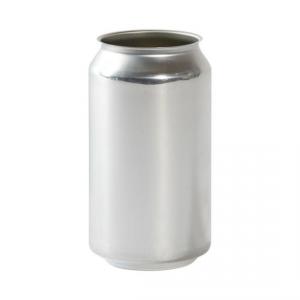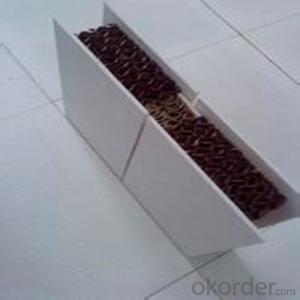Rigidized Stainless Steel Sheets - Best Quality Prepainted Galvanized Steel Coil from China
- Loading Port:
- Tianjin
- Payment Terms:
- TT OR LC
- Min Order Qty:
- 50 m.t.
- Supply Capability:
- 5000 m.t./month
OKorder Service Pledge
OKorder Financial Service
You Might Also Like
1. Pre-Painted Galvanized/Aluzinc Steel Coil Description:
With GI as base material, after pretreatment (degrease and chemical treatment ) and liquid dope with several layers of color, then after firing and cooling, finally the plate steel is called pre-painted galvanized (aluzinc) steel. Pre-painted galvanized steel is good capable of decoration, molding, corrosion resistance. It generally displays superior workability, durability and weather resistance.
2.Main Features of the Pre-Painted Galvanized/Aluzinc Steel Coil:
• Excellent process capability
• Smooth and flat surface
• Workability, durability
• Excellent heat resistance performance
• High strength
• Good formability
• Good visual effect
3.Pre-Painted Galvanized/Aluzinc Steel Coil Images
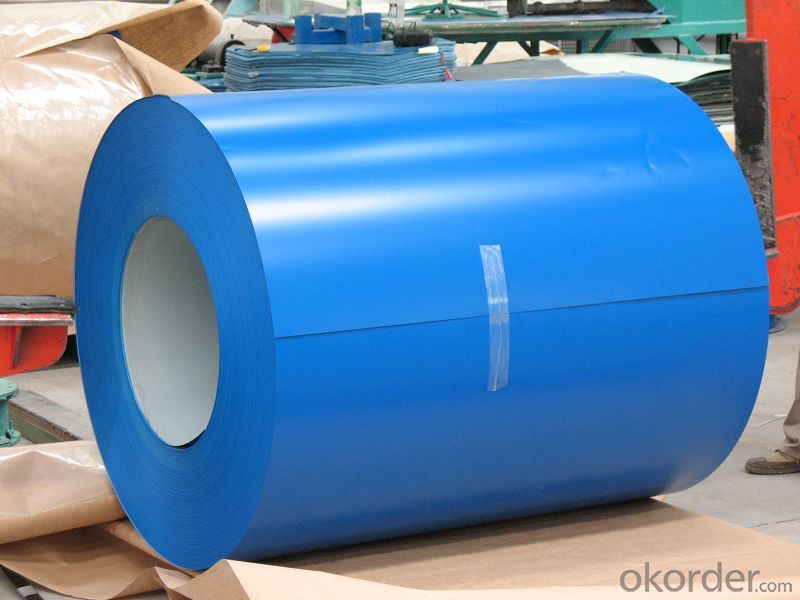
4.Pre-Painted Galvanized/Aluzinc Steel Coil Specification
Standard: AISI, ASTM, BS, DIN, GB, JIS
Grade: DX51D, DX52D
Thickness: 0.17-2.0mm
Brand Name: KMRLON
Model Number: coil
Type: Steel Coil
Technique: Cold Rolled
Surface Treatment: Coated
Application: Boiler Plate
Special Use: High-strength Steel Plate
Width: 20-1250mm
Length: customized
commoidty: pre-painted galvanized steel coil
Thickness: 0.13-4.0mm
width: 20-1250mm
zinc coating: 40-180g/m2
printing thickness: top side: 20+/-5 microns, back side: 5-7 microns
color: all RAL color
surface treatment: color coated
coil weight: 4-7 tons
coil ID: 508/610mm
packaging: standard seaworthy packing
5.FAQ of Pre-Painted Galvanized/Aluzinc Steel Coil
What’s the application of this product?
Roof, roof structure, surface sheet of balcony, frame of window, etc.
What’s the brand of the paint?
We use the best brand of all of the word—AKZO.
- Q:Can steel sheets be used for railway applications?
- Indeed, railway applications can make use of steel sheets. The utilization of steel sheets in the construction of railway tracks, bridges, and other infrastructure is widespread. This popularity arises from their remarkable qualities of high strength, durability, and resistance against wear and tear. Steel sheets can be molded into different forms and sizes to cater to the specific demands of railway applications. Moreover, the easy weldability of steel sheets enables the efficient and cost-effective installation and repair of railway components. All in all, the railway industry favors steel sheets due to their exceptional mechanical properties and ability to withstand heavy loads and adverse environmental conditions.
- Q:Can steel sheets be used in the food processing industry?
- Yes, steel sheets can be used in the food processing industry. Steel is a highly versatile and durable material that is commonly used in various applications in the food processing industry. Steel sheets are often used for constructing equipment and machinery such as tables, work surfaces, shelves, cabinets, and containers. Steel sheets have several properties that make them suitable for use in the food processing industry. Firstly, steel is resistant to corrosion, which is essential in an environment where food and liquids are constantly present. This resistance to corrosion ensures that the steel sheets maintain their structural integrity and do not contaminate the food being processed. Secondly, steel is easy to clean and sanitize, which is crucial in maintaining high standards of hygiene in the food processing industry. Steel sheets can be easily wiped clean, and their smooth surface prevents the accumulation of dirt, bacteria, and other contaminants that could potentially affect the quality and safety of the food. Additionally, steel sheets are strong and can withstand heavy loads and physical impacts. This makes them suitable for use in equipment and machinery that handle large quantities of food or require frequent movement or transportation. Moreover, steel is a non-porous material, meaning that it does not absorb or retain odors, flavors, or stains from the food being processed. This property ensures that the steel sheets do not affect the taste or quality of the food. In conclusion, steel sheets are commonly used in the food processing industry due to their durability, resistance to corrosion, ease of cleaning, and non-porous nature. They provide a reliable and hygienic solution for constructing equipment and machinery that is essential for food processing operations.
- Q:Can steel sheets be used for water treatment facilities?
- Yes, steel sheets can be used for water treatment facilities. Steel is a commonly used material in these facilities due to its durability, resistance to corrosion, and ability to withstand high pressure and temperature. Additionally, steel sheets can be easily fabricated and installed, making them suitable for various applications within water treatment facilities such as tanks, pipes, and equipment.
- Q:How do steel sheets handle water resistance?
- Steel sheets handle water resistance very well due to their inherent properties. Steel is a non-porous material, meaning it does not absorb water. Additionally, steel sheets are often coated with protective layers, such as galvanized or stainless steel finishes, which provide an extra barrier against water penetration. This makes steel sheets highly resistant to corrosion, rust, and water damage, making them suitable for various applications, including roofing, construction, and marine environments.
- Q:Can steel sheets be used for fencing or security purposes?
- Yes, steel sheets can be used for fencing or security purposes. Steel sheets are durable and sturdy, making them an excellent material for constructing fences and barriers that provide enhanced security and protection. Their strength and resistance to wear and tear make them suitable for withstanding various external factors and potential intrusions. Additionally, steel sheets can be customized to fit different designs and sizes, ensuring they meet specific fencing or security requirements.
- Q:What is the difference between an open plate and an original plate?
- Open and flat from the original flat surface color to distinguish. Because the Kaiping plate originally is rolled strip, the oxide is less, the same time the Kaiping plate and the original flat for a period of time after the original flat in different colors, red, and blue plates.
- Q:Are the steel sheets resistant to oil or grease?
- Yes, steel sheets are generally resistant to oil or grease. Steel is known for its durability and resistance to various chemicals, including oil and grease. The smooth surface of steel sheets makes it difficult for substances like oil or grease to adhere to them, allowing for easy cleaning and maintenance. Additionally, steel sheets can be further treated or coated with protective materials to enhance their resistance to oil or grease if required.
- Q:Are steel sheets suitable for manufacturing water pipes?
- Indeed, water pipes can be manufactured using steel sheets. Steel, being both durable and strong, possesses the ability to endure high pressure and corrosion, rendering it an optimal selection for water pipes. By skillfully molding and welding steel sheets, one can effortlessly produce seamless pipes that are impervious to leaks. Furthermore, steel pipes boast a lengthy lifespan and demand minimal upkeep, establishing themselves as an economically viable choice for water pipe production.
- Q:Can steel sheets be used in the telecommunications industry?
- Indeed, the telecommunications industry can make use of steel sheets. Given their strength, durability, and capability to safeguard delicate equipment, steel sheets find frequent application in various sectors of the telecommunications industry. They are commonly utilized in the production of communication towers, antenna mounts, equipment cabinets, and enclosures. By providing structural support, steel sheets prove resilient against severe weather conditions, including powerful winds, extreme temperatures, and heavy loads. Furthermore, steel sheets can be conveniently fabricated and tailored to meet specific demands, rendering them a favored option within the telecommunications industry.
- Q:What is the typical coefficient of thermal expansion of a steel sheet?
- Steel sheets typically have a coefficient of thermal expansion of approximately 10-12 ppm/°C. This signifies that for every degree Celsius rise in temperature, the steel sheet will expand uniformly in all directions by 10-12 ppm. However, it is crucial to acknowledge that the coefficient of thermal expansion may differ based on the precise type and composition of the steel. Various steel alloys may exhibit slightly varied coefficients, although the range of 10-12 ppm/°C is widely accepted as the average.
1. Manufacturer Overview |
|
|---|---|
| Location | |
| Year Established | |
| Annual Output Value | |
| Main Markets | |
| Company Certifications | |
2. Manufacturer Certificates |
|
|---|---|
| a) Certification Name | |
| Range | |
| Reference | |
| Validity Period | |
3. Manufacturer Capability |
|
|---|---|
| a)Trade Capacity | |
| Nearest Port | |
| Export Percentage | |
| No.of Employees in Trade Department | |
| Language Spoken: | |
| b)Factory Information | |
| Factory Size: | |
| No. of Production Lines | |
| Contract Manufacturing | |
| Product Price Range | |
Send your message to us
Rigidized Stainless Steel Sheets - Best Quality Prepainted Galvanized Steel Coil from China
- Loading Port:
- Tianjin
- Payment Terms:
- TT OR LC
- Min Order Qty:
- 50 m.t.
- Supply Capability:
- 5000 m.t./month
OKorder Service Pledge
OKorder Financial Service
Similar products
New products
Hot products
Hot Searches
Related keywords
